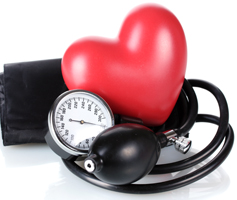Children’s Blood Pressure On The Rise Along With Obesity
December 31, 2016 In recent years, children have become progressively more at risk for high blood pressure, which can lead to an array of other serious medical conditions. Recent studies have been conducted on a national level, and many of them show that the amount of children and adolescents who have high blood pressure continues to escalate, compromising their health and overall wellbeing.
In recent years, children have become progressively more at risk for high blood pressure, which can lead to an array of other serious medical conditions. Recent studies have been conducted on a national level, and many of them show that the amount of children and adolescents who have high blood pressure continues to escalate, compromising their health and overall wellbeing.
High blood pressure often acts as an indicator for other medical problems and can cause permanent ones. It can lead to lasting organ damages, left ventricular hypertrophy (an enlargement of the heart’s primary pumping chamber), pre-hypertension, hypertension and atherosclerosis (a disorder of the arteries that can cause stroke and heart disease). Although doctors often measure children’s blood pressure at routine office visits, high blood pressure is, too often, not seriously evaluated or subsequently treated. With studies revealing that anywhere from 20% to 25% of children are overweight or obese, and that as many as 15% have high blood pressure, it is a very important medical issue to examine.
Blood pressure readings should begin at the age of 3 for patients. Data on children between the ages of 3-18 shows that nearly 4% have either pre-hypertension or full-blown hypertension. When children who are overweight or obese were tested for these conditions, the percentages went up drastically. For females, anywhere from 24-30% were affected and for males, 30%. And, although blood pressure readings are taken at doctor’s office appointments, the amount of times that hypertension is medically diagnosed is far too limited. Pediatrics, a medical journal, recently published an article citing that over three-quarters of children who have pre-hypertension or hypertension are not diagnosed. Without the proper diagnosis, there is no dietary, lifestyle or medical treatment offered, and the consequences can prove damaging to a child’s health, or even fatal.
There are many obstacles that doctor’s face in respect to diagnosing and treating high blood pressure in children and teens. One is that there is a general lack of information on what the proper medical course of action is when a child has high blood pressure. Without treatment options in place, medical professionals lack the knowledge on how to proceed. There are also many variables impacting high blood pressure for children, such as sex, height and weight. The article in Pediatrics also notes that parents need to play a much more integral role in the process, asking doctors to make sure to check their children’s blood pressure, report results and advise on how to help tackle the problem at home. Doctor’s recommend that if a child has high blood pressure upon a first reading, it is important to take two more. If all three prove high, then follow-up appointments should be scheduled to monitor any changes. It generally takes three separate appointments, all with high results being found, before the diagnosis of high blood pressure can be accurately given. If you have concerns about your child’s blood pressure or think that they may suffer from elevated blood pressure, please consult directly with your doctor.
As the information has shown, children who are overweight or obese are at a greater risk for high blood pressure. There are other risk factors, such as pulmonary diseases, kidney diseases, heart defects, hormonal abnormalities, genetic disorders, sleep apnea and the side effects of certain medications. There are different routes to take for the different cases—and causes—of high blood pressure. Depending on the medical reason, some doctors may recommend a change in lifestyle and/or diet. In other cases, medication could be necessary. However, as always, that is for a medical professional to evaluate and treat. We hope this information is of use to you and your family, and that it offers some guidance on helpful questions or concerns to address at your child’s next doctor’s office visit!
Philadelphia Medical Malpractice Lawyers at Galfand Berger, LLP Advocate for Proper Treatment of Obese Children with High Blood Pressure.
The Philadelphia medical malpractice lawyers at Galfand Berger have successfully represented clients who have been injured due to medical negligence, malpractice and misdiagnoses. If you or any of your loved ones have experienced such a situation, an attorney at Galfand Berger, LLP can help. With offices located in Philadelphia, Reading and Bethlehem, we serve clients throughout Pennsylvania and New Jersey. To schedule a consultation, call us at 800-222-8792 or complete our online contact form.
 Google Screened
Google Screened
